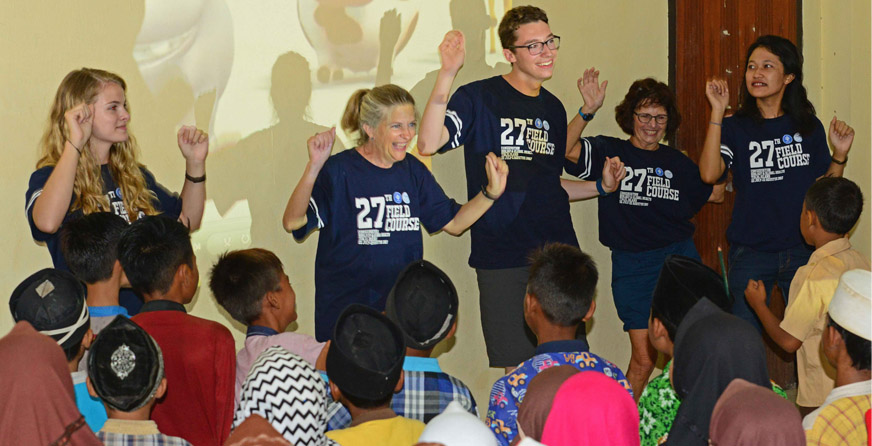
Indonesia trip highlight year of continuing Trinity research and studies abroad
Indonesia trip highlight year of continuing Trinity research and studies abroad
While Ribble’s group focused on small mammals, psychology professor Kimberley Phillips took students Anna Rigodanzo ’18 and Ryan Reusch ’18 to Indonesia to study non-human primates on a small island off the Indonesian coast. There, Phillips’ group studied a population of long-tailed macaques, a species of primate known for their inventiveness and mischievous nature.
This ongoing research, in collaboration with Randy Kyes at the University of Washington’s Center for Global Study and Entang Iskandar at the Institut Pertanian Bogor, in Bogor, West Java, Indonesia, is yielding curious revelations about how hand and finger use is connected to the brain.
“We’re looking at dexterity, problem-solving, and what that all can tell us about the brain,” Phillips says. “We basically were getting up close to these animals—who are habituated to humans—and providing them with tasks to solve.”
The 2017 trip was the third year of this study. In 2015, Phillips conducted basic exploratory work at the base camp, while 2016 saw her group refining their experimental techniques.
“One of the really fun things about working with monkeys is that they will solve things or destroy tasks in ways you’ve never imagined,” Phillips recalls. “In our third year, we were … better prepared for the tricks they might pull on us.”
Reusch and Rigodanzo learned this the hard way.
“We found that if you set down anything—coffee, your phone, anything— and walked away from it, these monkeys would run off with your stuff,” Rigodanzo says.
While Rigodanzo and Reusch were the only undergraduates on the trip, the pair made their mark on the research by coming up with tasks for the animals to complete.
An example of such a task, Reusch explains, was presenting the macaques with a PVC pipe filled with ketchup, honey, or another treat. The pipe was too narrow for the animals to fit their hands inside, forcing them to use a tool. Phillips’ team was mostly interested in observing which hand—left or right— the macaques preferred to use.
“These tendencies can tell us about brain lateralization,” notes Phillips, who also intends to expand her collaboration with Kyes and Iskandar in future years. “We’re still learning things about the brain from these creatures: they can solve problems in ways you’ve never imagined before.”
Original content by Jeremy Gerlach
Photo by Entang Iskandar




